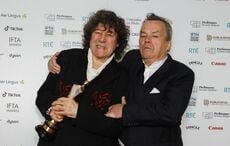Like the character he plays in the Academy-Award winning movie “Once,” Glen Hansard began his career singing with his guitar on the streets of Dublin for small change.
And, as seen in the movie, he sometimes shared the streets with members of the enthusiastic Hare Krishna sect, a group that dances in circles chanting their favorite name of god. But what the movie does not reveal is that Hansard is himself a Hare Krishna follower.
“What I like about Hare Krishnas is that you eat, you dance, and you sing your way to God,” he explained.
In 1991, Hansard formed the Irish rock band The Frames, and they released their last album in 2007. That same year, Hansard was the first Irishman to ever win an Oscar for the Best Song category. The song “Falling Slowly,” was in the soundtrack of the movie “Once,” a modern day musical about a Busker and a woman who write, rehearse and record songs that tell their love story.
Hansard spoke about his faith to a group of Columbia University journalism students on board a Dublin-New York flight in late March. The students were returning from a trip in Ireland in March, where they reported for their religion class. (Visit their site, “Beyond the Brogue”)
Hansard, shoeless and sipping tea comfortably in coach, had just attended his father’s funeral in Ireland and wasn’t interested in talking about his career. (“That’s boring,” he dismissed.) But he was eager to share his thoughts on spirituality and his conversion to the Hare Krishna faith.
Hansard, 39, dropped out of school at age 13 to devote himself to his music career, which started with busking in the streets of Dublin. One day, he befriended a group of Hare Krishnas, who had asked him to take care of their instruments and sweets while they distributed Krishna literature. His spiritual mind was immediately taken by the chants and the beliefs of Krishna.
His spiritual path to the Hare Krishnas was an unlikely one. Hansard was born into a Catholic family that he said always had a love-hate relationship with the religion. His parents were only 16 when his mother got pregnant with him; they ran away from home to escape their conservative Catholic families.
His parents raised him as a Catholic but they never interfered in his spiritual endeavors and his eventual conversion.
"I was an altar boy, but I didn't understand religion,” he said, “and as I grew up I started asking questions, and I didn't find the answers in Catholicism.”
He continued to ask questions, and read spiritual classics like Richard Bach's “Jonathan Livington Seagull” and Khalil Gibran's “The Prophet.” But the turning point came when he read the Vedas, the Hindu Holy scriptures, and traveled to the island of Inis Rath in Ireland where the Hare Krishnas had established a commune in 1985. While there, he converted to the religion.
Hare Krishna is a branch of Hinduism, but differs from other schools within the religion because followers worship a sole creator god – the Lord Krishna – above all other deities.
Hare Krishnas believe the religion dates back to the 16th century, and was founded by the Hindu monk Sri Chaitanya in Bengal, India. He focused on the worship of Krishna and encouraged chanting and celebratory dancing in his honor on the temple and on the streets.
The name of the order itself comes from its chant, a continuous repetition of the God’s names, which creates vibration patterns that followers believe bring them to a higher connection to the Almighty.
The religion was brought to the West in the 1960s when Swami Prabhupada, a Hindu monk, started finding converts to the precepts of self-renunciation, and founding temples worldwide.
Hansard himself was intrigued by the devotion of young Hare Krishnas who worshipped with every action in their lives.
“When I first was with young Krishnas my age they had brought back soils from Mathura,” he said, referring to the Indian birthplace of Swami Prabhupada and Krishna. “They were so passionate that they were eating the soil.”
Hansard admired the lives of the sadhus, the holy men in Hinduism who wear saffron robes and take vows of celibacy, and even contemplated joining the monastic order.
“What struck me about the monastic Hare Krishna life is that they were waking up early, praying, eating vegetarian food and singing,” he said. “When you're young, you want the needle to hit the record, you know?”
But he decided against becoming a monk to focus on his music career instead. While playing with the Irish band, The Frames, he continued looking for ways to reconcile his different journeys, spiritual and musical. Hansard performed for the 80th birthday of Swami Prabhupada in London, and stayed at a manor donated to the Hare Krishnas by The Beatles’ George Harrison, a Hare Krishna himself.
Although he identifies himself as a Hare Krishna, Hansard said he still feels a strong connection with the culture of mysticism that is so powerful in Celtic traditions.
“It's written in our history books,” he said. “I make art and that's great, but digging in the hole and growing potatoes is a higher calling. In Ireland, the land is pulsing.”
Perhaps it’s this cultural resonance that prompts Hansard to keep an open mind, including with his Catholic upbringing. He has walked the pilgrimage of the Santiago de Compostela in Galicia, Spain, four times. While touring, he constantly meets fans from other religious backgrounds.
“You're defined by your beliefs, and I want to be fluid because there are so many people who follow different religions,” he said. “You have to give up a little bit of what you believe to understand that.”




Comments